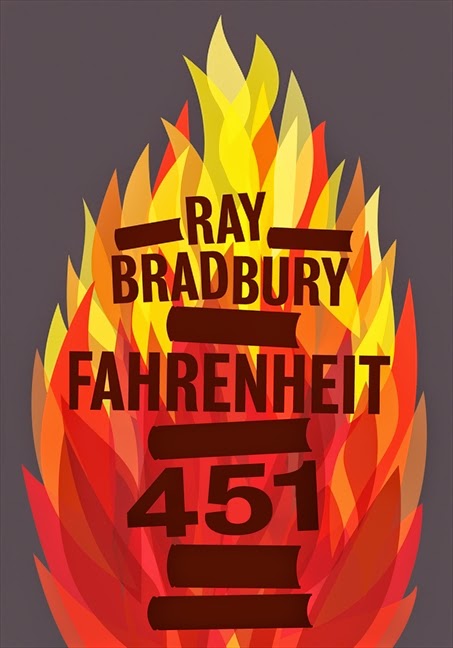 Staff Review by Chris Saliba
Staff Review by Chris SalibaRay Bradbury's Fahrenheit 451 remains an extraordinarily visionary work. In it he sees our current addiction to technology and media, and how disengaged we have become with politics and reality. The only thing missing today, thankfully, is the burning of books.
Cold War Fears and Tensions
Fahrenheit 451 is the classic dystopian science fiction novel by Ray Bradbury, first published in 1953. The writing and publication history of the novel is quite interesting. Bradbury said the novel essentially developed from a 1951 short story called “The Pedestrian”. This story was inspired by a real life event. While taking a late night walk in 1949, Bradbury was asked by a suspicious police officer to explain himself. In the short story, the suspicious walker is taken to a psychiatric centre. Most people, it is understood, should be indoors watching their ‘viewing screens’ – televisions. To be out walking is seen as quite bizarre when you have a mass media to consume.
Another short story, written between 1947 – 1948 and called “Bright Phoenix”, contains the theme of book burning as a means of censorship. Bradbury conflated the two themes of “The Pedestrian” and “Bright Phoenix” to write the novella “The Fireman” in 1951. The first 25,000 word draft was written on a library typewriter that he rented at the cost of 10 cents per half hour. Urged by a publisher at Ballantine books, he expanded the novella to its current length. It was published as a paperback in 1953, then the following year it was serialised in Playboy magazine.
As you can imagine, Fahrenheit 451 is drenched in cold war fears and tensions. The early fifties was an era of McCarthyism and the House Committee on Un-American Activities. Many American writers had their careers ruined by the committee’s investigations. Bradbury would also have been influenced by the the Nazi book burnings and Joseph Stalin’s Great Purge, which saw artists, writers and poets arrested, some even executed.
Technology Addiction and Political Disengagement
The plot of the novel follows Guy Montag, a “fireman” hired to burn books. He clearly has doubts about what he’s doing. He’s married to Mildred, who’s hooked on sleeping tablets and addicted to what we would perhaps call in our day reality TV. They have a parlour where three of the walls have giant TV screens that boom out dialogue. Mildred wants to get the fourth wall covered with a screen as well.
The reason that it has been deemed necessary by the government to burn books is that they add too much complexity to life. They provoke thought, demand serious intellectual attention and are often controversial in their contents. Government would rather everyone be zoned out watching their screens or listening to their musical shells (like today’s iPods).
Meanwhile, a huge nuclear war is being planned. Yet the whole populace is so hooked on mind-numbing mass media trivialities, that they don’t see the looming danger. Many of Mildred’s set of friends fail to grasp what a war will really mean for them.
It all ends rather apocalyptically. Ironically enough, a purifying fire allows the first steps of a new literary book culture to emerge.
I must admit to not really being a big science fiction fan. You really have to believe the world that has been created, and I sometimes find it hard to stay convincingly in that science fiction world . Maybe it's a failure of imagination on my part. Some of the things that happened in Fahrenheit 451 seemed a bit corny, like when Morag meets a group of exiled drifters who have memorised books in the hope of using their knowledge to create a new society.
A Visionary Book
Having said that, you really have to take your hat off to Bradbury’s prescience. What a visionary! So much of the world we live in today is pretty much there in Fahrenheit 451: the mass media, the populace anesthetized by it, the lack of interest in politics, the reducing of complex information to soundbites and tweets, even technical inventions like ATMs and iPods. No wonder people keep reading it today.
The book is perhaps best read as a critique of 20th century mass media and the political culture that has grown hand in hand with it. It’s very much of its time, but maybe belonging to our time even more, which is quite a scary thought.
Fahrenheit 451, by Ray Bradbury. Published by Voyager. ISBN: 9780007491568 RRP: $24.99
To sign up for our monthly newsletter, featuring new releases, book reviews and favourite articles from around the web, click here.
No comments:
Post a Comment